Description of the shape, flavor and taste characteristics of Yunnan Arabica coffee bean varieties
The taste of coffee is initially related to the variety of coffee. Arabica coffee has always been regarded as boutique coffee, while Robusta coffee has a bitter taste and is not easily accepted, so it is usually used to mix espresso.
Yunnan small grain coffee just began to grow small seed coffee, small seed coffee is also called Arabica coffee. Yunnan small grain originally got its name from the iron card, because the iron card seed is the Arabica small seed. The oldest variety of coffee in Yunnan is the tin card. Later, Nestl é settled in Yunnan, because of the poor disease resistance of the iron pickup, but also in order to increase the output of coffee beans, coffee farmers cut down the iron pickup coffee trees with good flavor to plant varieties with poor flavor but good disease resistance and high yield. S288, which is resistant to leaf rust, was initially introduced, and later Katim, which had a higher yield, was introduced. In other words, the coffee trees planted in Yunnan are mainly Katim varieties, and Yunnan small-grain coffee is Katim coffee.
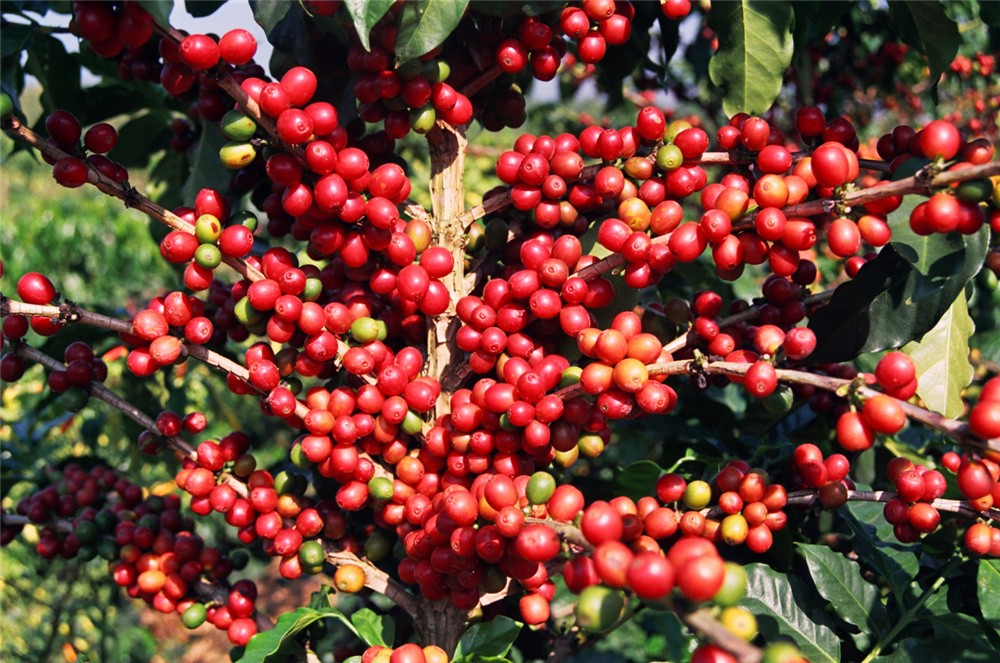
"small grain" refers to the smaller Arabica variety of coffee, compared with Hainan's medium-grain robusta coffee beans. Yunnan originally introduced two pure Arabica species, the iron pickup and the bourbon, and the ancient iron pickup is recognized as a high-quality variety. The famous Jamaican Blue Mountain Coffee is a kind of tin card, with rich aroma, delicate and diverse flavor, but the yield is very low, and it is vulnerable to rust, so more manpower management is needed. After all, coffee is a crop used by Yunnan farmers to make a living, and it is difficult to keep growing if the yield is too low to meet the income, so most Yunnan farmers choose to switch to a more productive variety: Katim.
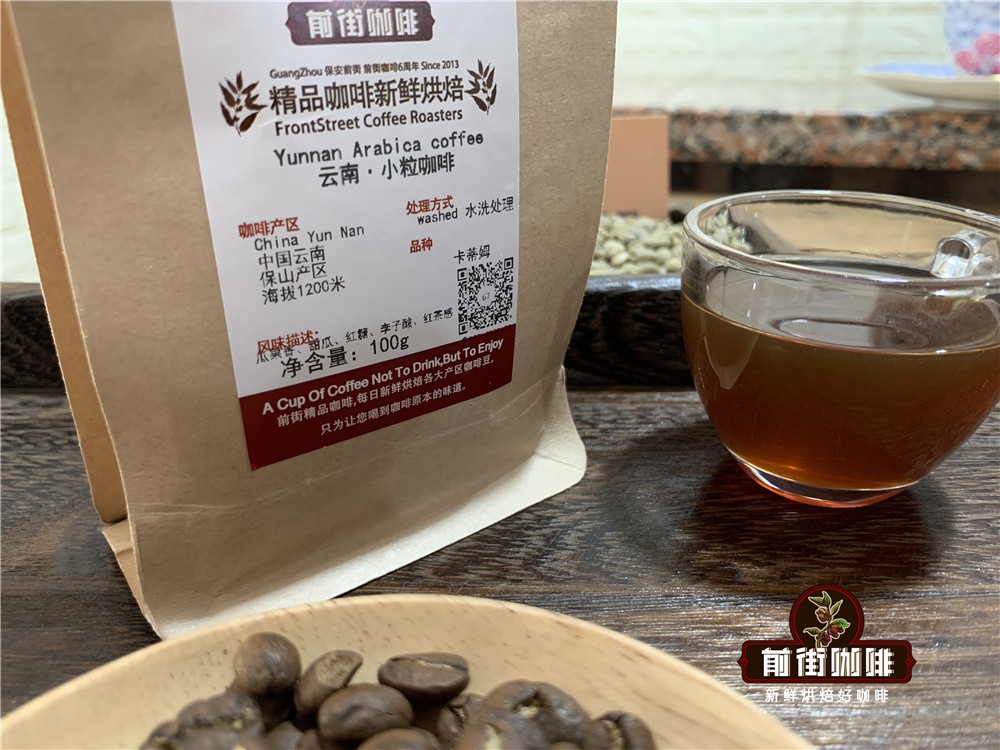
As a kind of crop, coffee flavor is always closely related to variety, climate, altitude, soil, management and other factors, which is the natural embodiment of varieties and local soil. Now the Yunnan small grain coffee on the market is the Katim variety, that flavor is naturally not as good as the tin card variety. But Yunnan coffee beans are also Asian beans, which naturally have the basic flavor of Asian beans, such as: herbaceous flavor, a little nutty, with sour fruit. On the whole, it is neither bitter nor sour, and it is also a very good coffee!
Iron pickup
The oldest native variety in Ethiopia was discovered between the 15th and 16th centuries AD. The iron pickup is characterized by a tall coffee tree, bronzed leaves at the top, large and long coffee beans, pointed at both ends, a bit like an egg. Iron pickup coffee often has a sour citrus taste, with a sweet aftertaste, is praised by many people as elegant and clean coffee beans. Unfortunately, its low yield and poor resistance to leaf rust were gradually replaced by farmers with other more robust varieties.
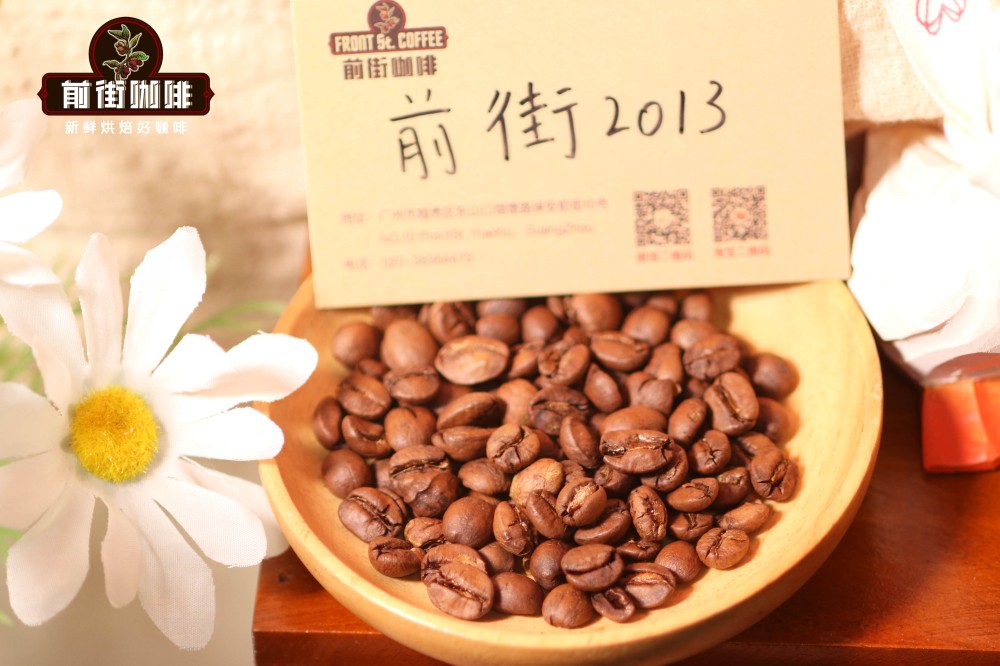
Iron pickups were introduced to this country by Sir Nicholas Lawes in the 18th century and were soon introduced to the Blue Mountains for cultivation for more than two hundred years. And the blue mountain iron card also adapted to the local island rainforest climate, evolved a stronger disease resistance, in which coffee berry disease will be much stronger than the general tin card. Qianjie believes that the exquisite and clean flavor of the Blue Mountains is inseparable from Jamaica's careful cultivation of the varieties of iron pickups, which makes them integrate into the local soil, as well as the excellent soil and unique microclimate of the Blue Mountains. The front street uses medium-depth baking to maximize the chocolate and nutty aromas of coffee, while retaining soft acidity and sweetness, making the overall taste balanced.
Katim.
At present, most of the coffee varieties grown in Yunnan are Katim, because the coffee trees of iron card varieties are vulnerable to coffee leaf rust, which leads to their low yield. So local farmers cut down the elegant variety of iron pickup and switched to Katim, which is more productive and resistant to coffee leaf rust.
In Han Huaizong's introduction to coffee producing areas in China in his book Fine Coffee, it is mentioned that in 1998, more than 90% of Yunnan coffee varieties were Katim.
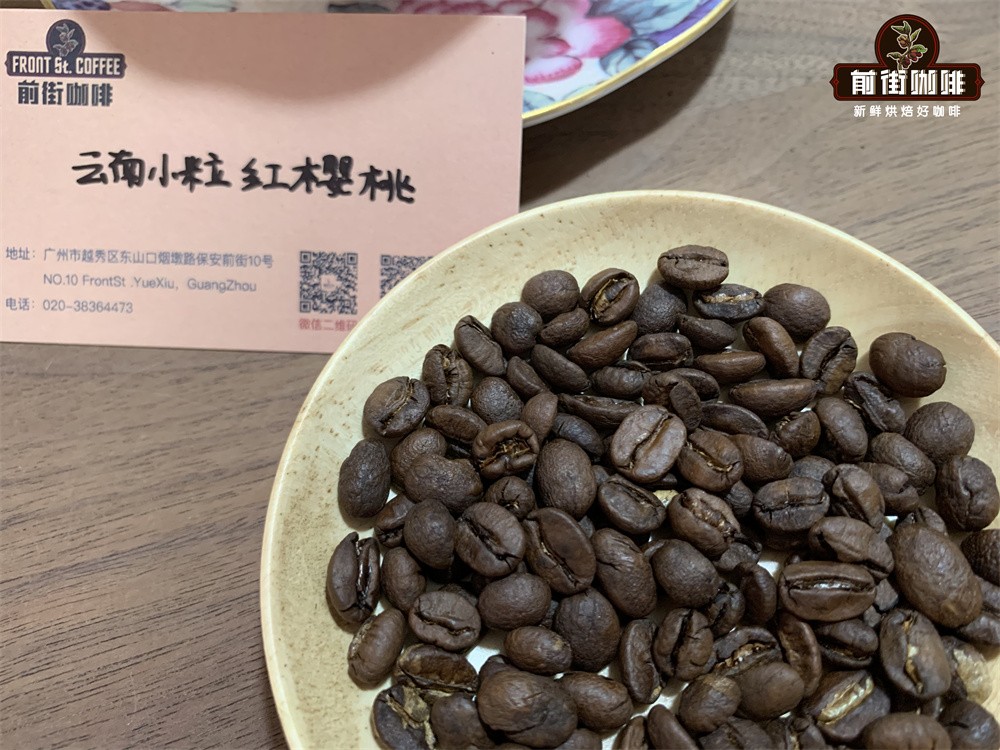
Katim is a new hybrid of Timor and Kaddura developed by the Portuguese coffee leaf rust research center CIFC in 1959. The Katim variety is characterized by high yield, short plant, close planting and good disease resistance. However, because the Katim variety carries the Robusta gene, its bitterness and fishy smell are more obvious than those of Arabica purebred, and have a slight disadvantage in cleanliness, fruit charm and richness. Robusta species has good resistance to leaf rust and rich oil, high yield and easy to grow. After crossing with Arabica tin card, Katim has 25% Robusta gene, which improves the resistance to leaf rust and retains rich oil. At the same time, it also has the rich taste of some tin card native species, so at present, most Yunnan manors have begun to plant Katim in a large area. The planting range of iron pickups began to shrink.
Arabica coffee
Arabica (scientific name Coffee Arabica), also known as small-grain coffee beans, is native to Ethiopia. At first, Arabica coffee was mainly used as medicine, but later people developed the habit of drinking it after baking. It was spread to all parts of the world by Arabs through trade in the 16th century and gradually developed into a popular drink today. Many of the boutique coffee beans we are familiar with belong to Arabica varieties, such as Jamaica Blue Mountain Coffee, Panamanian Rose Summer Coffee, Essex Sheffield Coffee and so on.
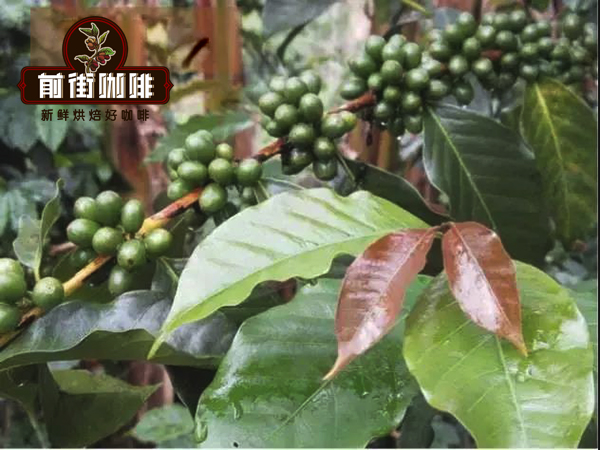
The larger shrubs of the Arabica species are suitable for planting in mountain environments at altitudes of 600-2200 m (Ethiopia also has seed value and excellent quality up to 2350 m above sea level), temperatures of 15 °- 24 °C and annual rainfall of 1200-2200 mm. The leaves are oval, dark green, the fruit is also oval, there are generally two slightly flat beans, the bean body is round, the front is long oval, the middle crack is narrow and curved S-shaped, and the arc on the back of the bean is flat.
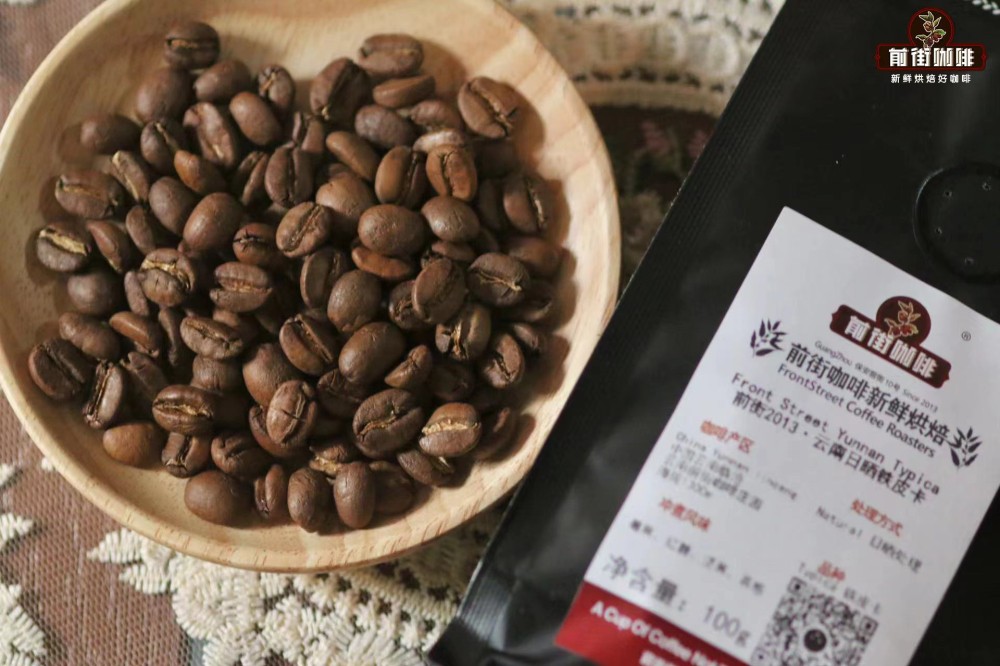
Arabica's chlorogenic acid is low, about 5.5% to 8%. Chlorogenic acid is not only antioxidant, but also an important component of resistance to pests, so Arabica is more vulnerable to insect damage and climate, and is generally planted at higher elevations. the fruit is less and slower, so there are fewer coffee beans per hectare than Robusta, which makes Arabica much more expensive to grow.
The flavor of Arabica coffee
The bitter taste we taste when we drink coffee is mainly due to the chlorogenic acid in the coffee. Robusta has high levels of caffeine, amino acids and chlorogenic acid. So Robusta was born without the elegant aroma of Arabica beans and replaced it with a fuller, lower bitterness. Arabica has a low level of caffeine, about 0.9% to 1.2%. It contains 60% more fat than robusta coffee. Compared with the strong robusta beans, Arabica has low caffeine and twice as much sugar as robusta beans, so Arabica coffee tastes soft, sweet and sour, so it has become the first choice for everyone to drink coffee.
The main growing areas of coffee in Yunnan
At present, Yunnan coffee is mainly grown in Pu'er, Wenshan, Baoshan, Dehong and Lincang in the south and west of Yunnan.
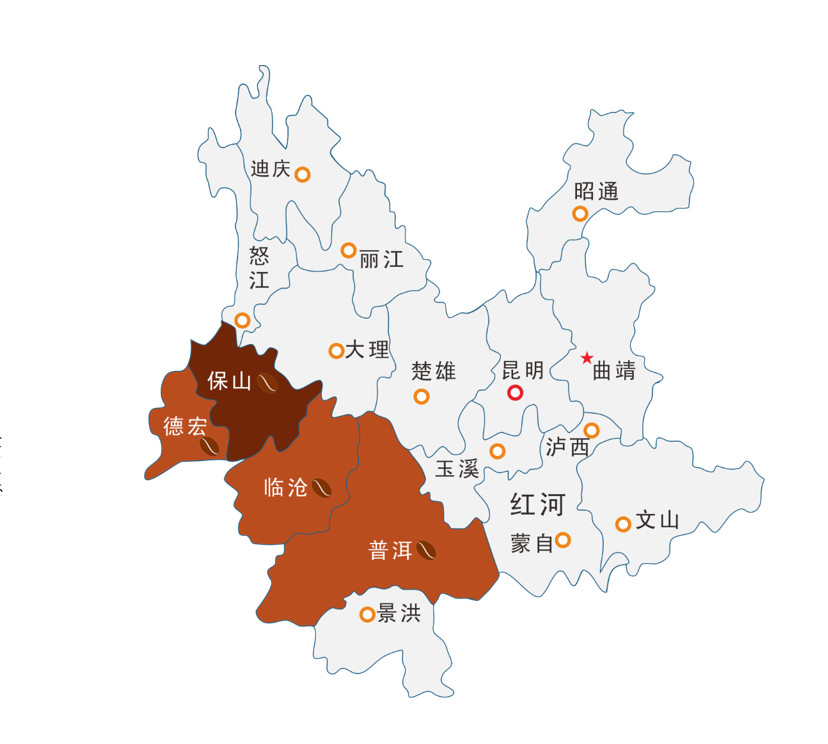
Dehong: it has the laudatory name of "hometown of Chinese coffee". The coffee planting in Dehong Prefecture is above 1000 meters above sea level, of which 30, 000 mu are planted in the mountains above 1600 meters above sea level. in addition, the coffee grown in Dehong Prefecture mainly uses organic fertilizers and organic pesticides, resulting in high quality coffee. it is one of the rare high-quality coffee producing areas in the world. Baoshan: the cultivation of coffee in Baoshan began in the mid-1950s, and the first coffee seedling was introduced by the late patriotic overseas Chinese Mr. Liang Jinshan in Southeast Asia. In recent years, with the expansion of international trade, Lujiangba's small-grain coffee is more famous. Merchants in Europe, the United States, Egypt, Hong Kong and Macao, especially in Britain, the United States, Egypt, Hong Kong and Macao all regard it as top-grade coffee, and their products are in short supply. In December 2010, after being examined and approved by China's General Administration of quality Supervision, Inspection and Quarantine, it was decided to implement national geographical indication product protection for "Baoshan small Coffee".
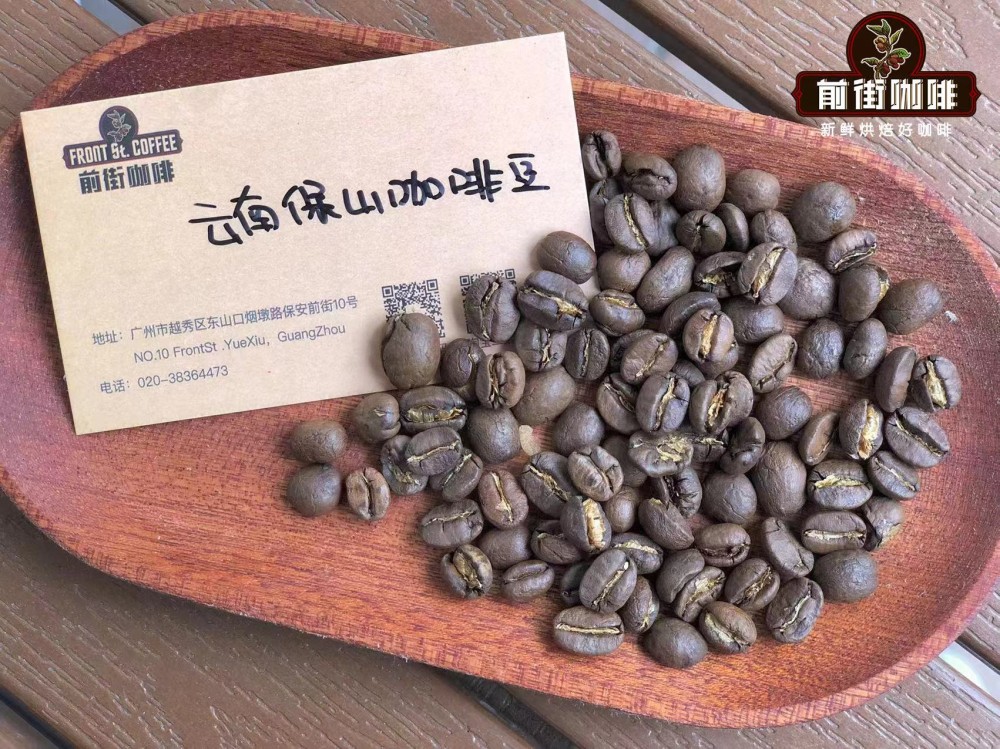
Lincang
Lincang City is located in the southwest of Yunnan Province. The Tropic of Cancer runs through the south. It is adjacent to Pu'er to the east. It is bordered by Dali to the north, Baoshan to the west and Myanmar to the southwest. Therefore, it is also known as the Lancang River, which is a bright pearl in the southwest border of China. The annual average temperature in Lincang City is between 16.8 and 17.2 ℃. The dry and humid seasons are obvious and the sunshine is abundant. Lincang City has become the focus of many coffee enterprises because of its unique geographical location and climatic conditions. 200 mu and 100 mu of high-quality coffee seedling bases were established in Mengding Town and Lincang Happy Farm in Gengma Autonomous County, and coffee was planted in Gengma, Zhenkang, Yunxian, Cangyuan and Yongde. Because of its unique geographical location and climatic conditions, Lincang has become the focus of many coffee enterprises, and 200 mu and 100 mu of high-quality coffee breeding bases have been established in Mengding Town and Lincang Happy Farm in Gengma Autonomous County of the city. coffee is planted in Gengma, Zhenkang, Yun County, Cangyuan, Yongde and other places.
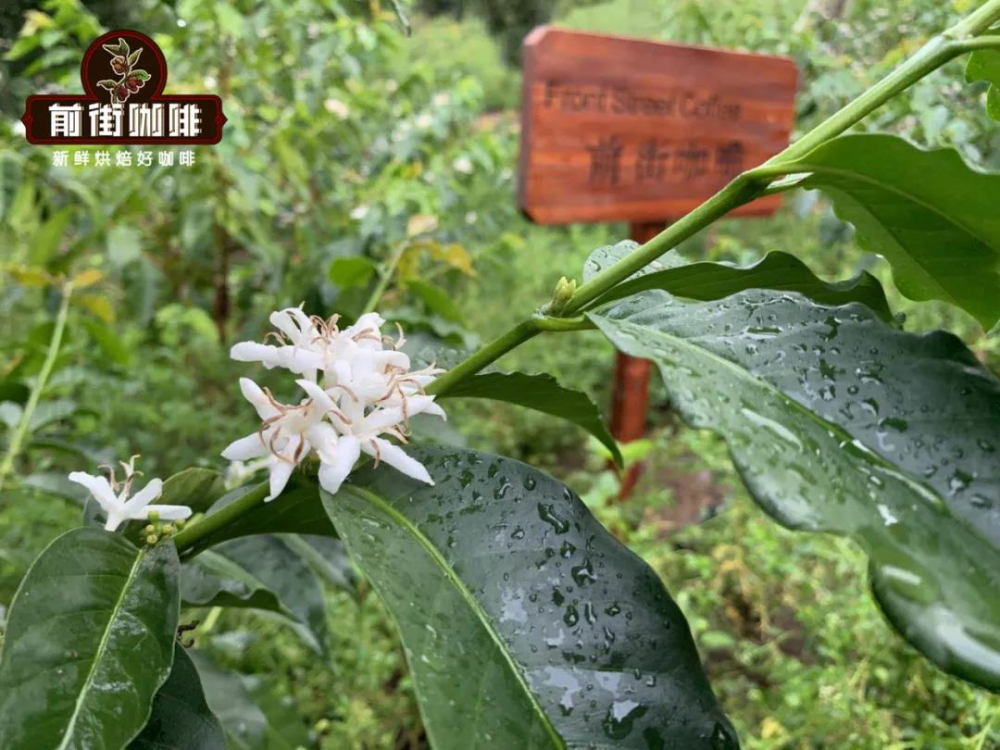
Qianjie Coffee has set up its own manor in Lincang, Yunnan Province. Qianjie bred iron card species, which is a pure Arabica species, which is better than the Katim species currently planted in Yunnan. It takes at least 4-5 years from the seedling to the first fruit, and this is also because the Katim species in Yunnan know that the flavor of the Katim species is inferior, and they are not willing to overthrow the re-planting. Qianjie produced the first batch of Yunnan coffee beans in 2020-21, named "Qianjie 2013", which was well received by everyone.
Treatment methods of Yunnan coffee beans
The weather in Yunnan is rainy and foggy, so washing treatment has become the most commonly used method of coffee treatment in Yunnan. Of course, there are also sun treatments, such as Sun Katim Coffee in Qianjie and Iron pickup Coffee in Qianjie on 2013.
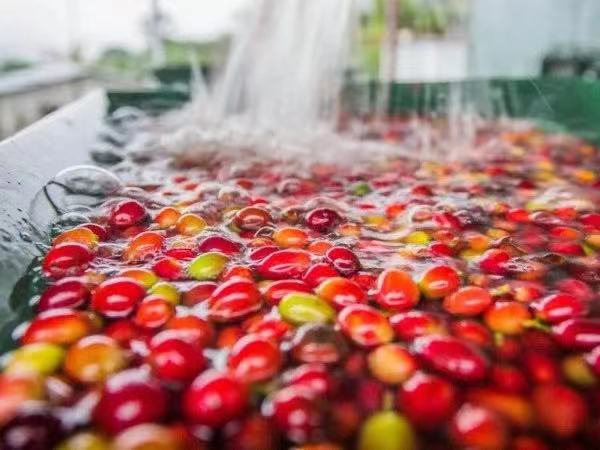
Washing treatment: the harvested berries are peeled to separate most of the pulp from the coffee beans, then the shelled beans are directed to a clean sink, soaked in water and fermented to thoroughly remove the residual pulp layer. Through washing, unripe beans and defective beans are selected because of buoyancy, and the fermentation process is easier to control, so the flavor is not mixed like sun beans, but shows obvious acidity, complexity and cleaner characteristics in the cup.
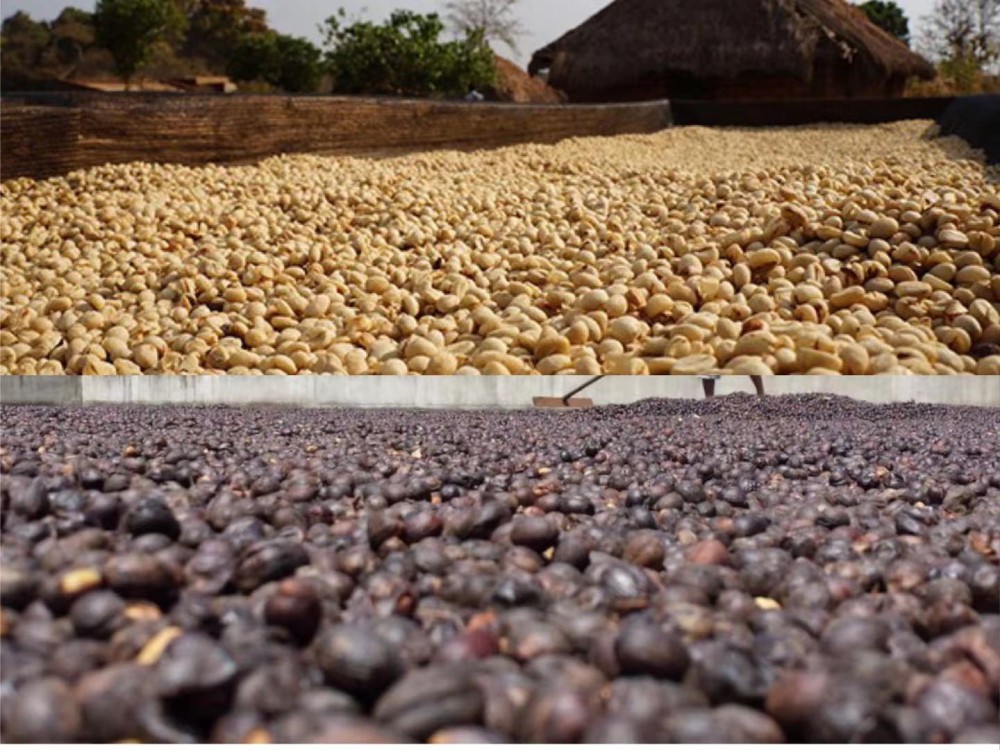
Parameters of Yunnan coffee brewed in Qianjie:
In order to retain the sweet and sour and tea characteristics of Yunnan coffee, Qianjie coffee roasted it moderately. V60 filter cup can be used when brewing, powder-water ratio at 1:15, medium grinding (about the size of coarse sugar / 75% screening rate of China 20 standard sieve), water temperature of 88 degrees.
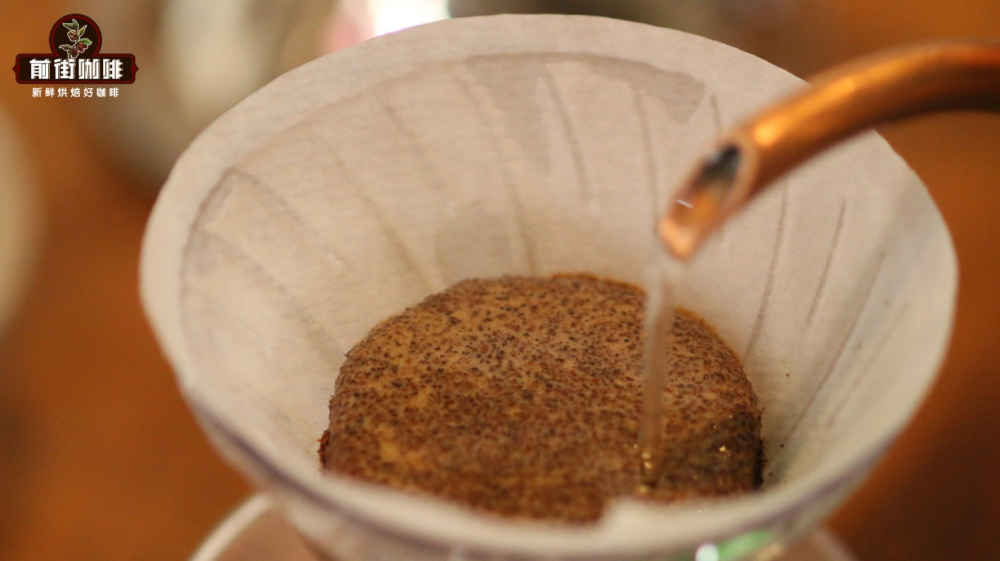
The use of segmented extraction, with twice the amount of coffee powder water for steaming, that is, 30 grams of water for 30 seconds, and the reason for the need for steaming process is to make coffee powder can discharge the internal carbon dioxide gas, so that the latter stage of the extraction is better stable. When the small water is injected around the circle to 125 grams, the injection will be stopped until 225 grams, then the filter cup will be removed after the dripping of the filter cup, and the extraction time will be 2 minutes 39 grams. Next, pick up and shake the whole cup of coffee, then pour it into the cup and taste it.
[Qianjie washed Yunnan small-grain coffee flavor] herbs, nutty aromas, chocolate, caramel, with a hint of acidity in the finish.
[Qianjie Yunnan Sunshine Katim Coffee] performance: nuts, chocolate, spices, caramel, plums.
[Qianjie 2013 sun iron pickup coffee flavor]: with nutty tone, taste more solid than washed Yunnan coffee, slightly lower acidity and water washed iron pickup Yunnan coffee, but slightly more sweetness, higher sense of balance, berry-like acidity, mixed with brown sugar, and a slight sense of tea.
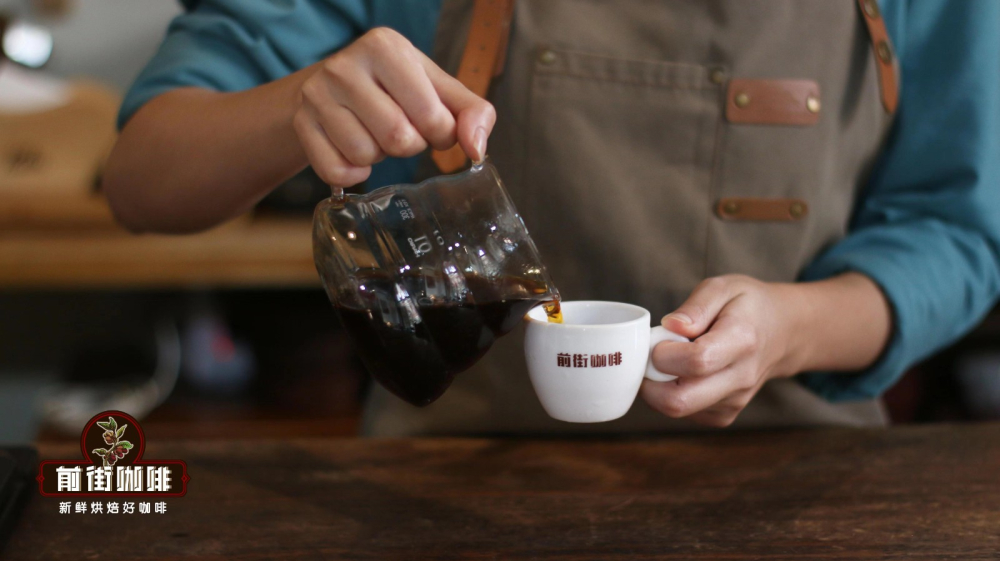
Suggestions for making coffee in front of the street:
To brew a good cup of coffee, you still need to pay attention to the freshness of the beans. Qianjie has always believed that the freshness of coffee beans has a great relationship with the flavor of coffee, so the coffee beans shipped in Qianjie coffee are roasted within 5 days. The purpose of Qianjie roasting is "freshly roasted coffee", so that every guest who places an order is the freshest coffee when he receives it. The bean cultivation period of coffee is about 4-7 days, so when the guest gets it, it is the time when the flavor is the best.
For those who need to be ground, Qianjie warmly reminds you that if the coffee beans are ground in advance, there is no need to raise the beans, because in the process of transportation, the pressure caused by carbon dioxide in the package can also make the coffee flavor round. so you can drink a cup of coffee as soon as you receive the coffee powder. But the coffee powder needs to be brewed in time, because the coffee powder oxidizes more quickly after contact with the air, that is to say, the flavor of the coffee will dissipate more quickly, and the flavor of the coffee is not so good. Therefore, Qianjie suggests buying whole beans, grinding and flushing now, so that we can better taste the flavor of coffee.
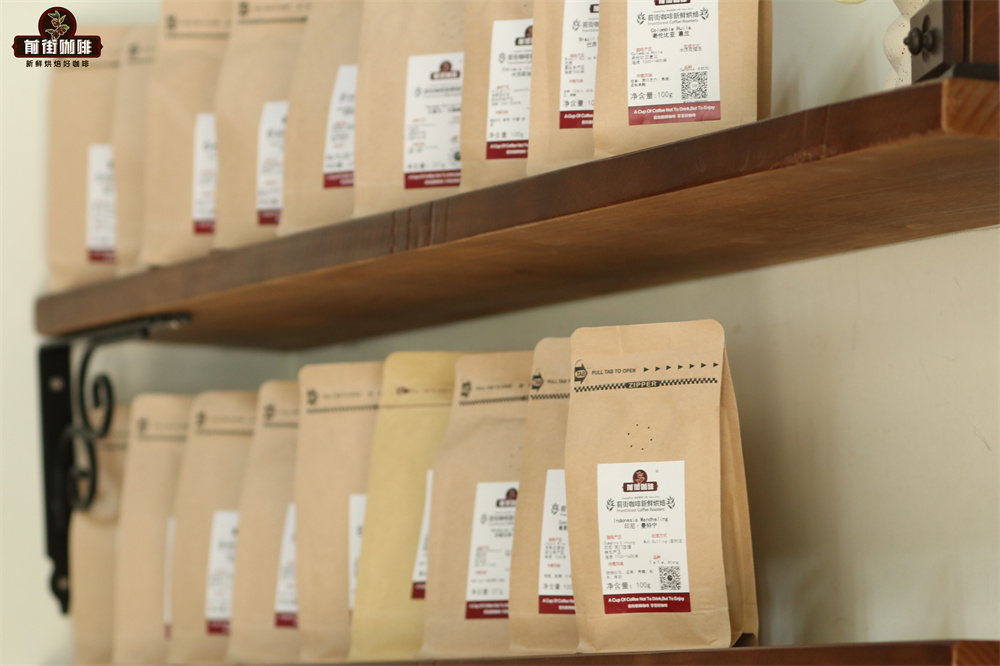
Washed Yunnan small grain coffee as the front street rations beans, naturally represents the flavor characteristics of Yunnan coffee beans, taste Yunnan small grain coffee, then we know the flavor of Yunnan coffee probably. Qianjie rations beans are the coffee flavor representatives of various producing countries, the performance-to-price ratio is very high. The reason why Qianjie has rations beans is to enable people to taste the coffee flavor characteristics of each country from the rations beans, so as to choose their own favorite coffee beans. In this way, you can also judge your favorite taste by rations beans. For example, some people like the small and fresh flower and fruit notes of Ethiopia, others like the soft acidity of Colombian nut dark chocolate, of course, there must be citrus notes of Panamanian Rosa Coffee, and so on.
Professional coffee knowledge exchange more coffee bean information please follow the coffee workshop (Wechat official account cafe_style)
For more boutique coffee beans, please add private Qianjie coffee on Wechat. WeChat account: qjcoffeex
Important Notice :
前街咖啡 FrontStreet Coffee has moved to new addredd:
FrontStreet Coffee Address: 315,Donghua East Road,GuangZhou
Tel:020 38364473
- Prev
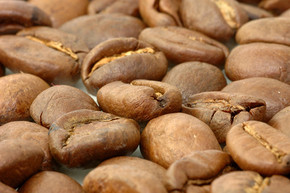
Introduction to the hometown of Arabica Coffee and Ethiopia Coffee
Following caf é (Wechat official account vdailycom) found that Beautiful Caf é opened a small shop of its own Ethiopia is the hometown of Arabica coffee, it is in the forests of the Kaffa region that you can see wild Arabica coffee. In Ethiopian, coffee is called Bun or Buna, and coffee beans (coffeebean) may be turned from Kaffa Bun
- Next

Arabica Coffee originated in Ethiopia, Overview of Arabica Coffee
Following Cafe Review (Wechat official account vdailycom) found that Beautiful Cafe opened a small shop of its own. Ethiopia is a coffee producer with many legends, numerous varieties, rich orange flavor and so many things that there is no second country in the world that can compete with it. Ethiopia's long coffee history and cultural scenery have attracted a large number of explorers, archaeologists, botanists, anthropologists and literature for hundreds of years.
Related
- Detailed explanation of Jadeite planting Land in Panamanian Jadeite Manor introduction to the grading system of Jadeite competitive bidding, Red bid, Green bid and Rose Summer
- Story of Coffee planting in Brenka region of Costa Rica Stonehenge Manor anaerobic heavy honey treatment of flavor mouth
- What's on the barrel of Blue Mountain Coffee beans?
- Can American coffee also pull flowers? How to use hot American style to pull out a good-looking pattern?
- Can you make a cold extract with coffee beans? What is the right proportion for cold-extracted coffee formula?
- Indonesian PWN Gold Mandrine Coffee Origin Features Flavor How to Chong? Mandolin coffee is American.
- A brief introduction to the flavor characteristics of Brazilian yellow bourbon coffee beans
- What is the effect of different water quality on the flavor of cold-extracted coffee? What kind of water is best for brewing coffee?
- Why do you think of Rose Summer whenever you mention Panamanian coffee?
- Introduction to the characteristics of authentic blue mountain coffee bean producing areas? What is the CIB Coffee Authority in Jamaica?

